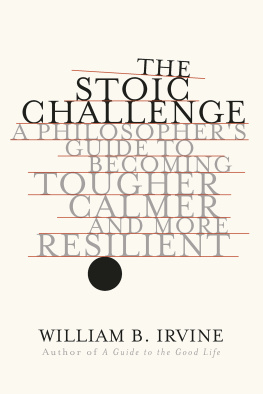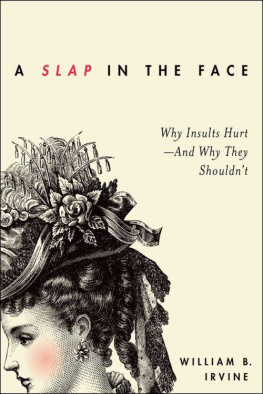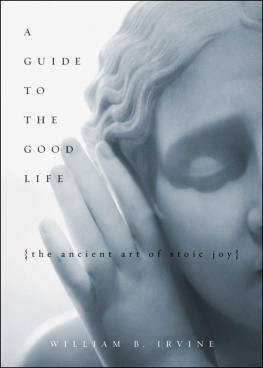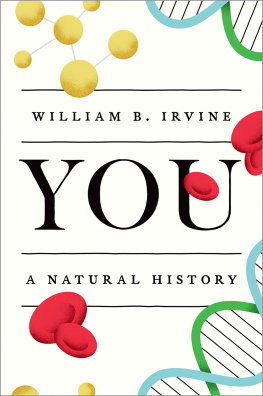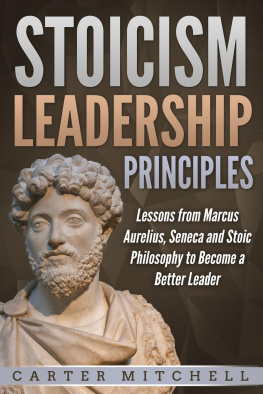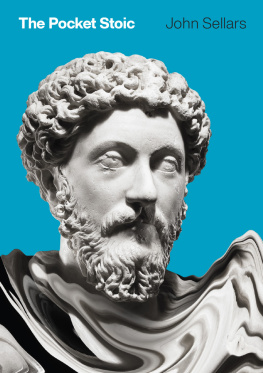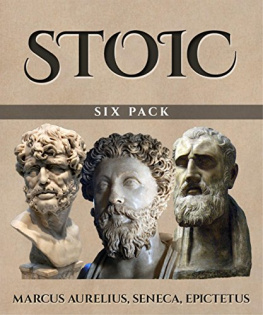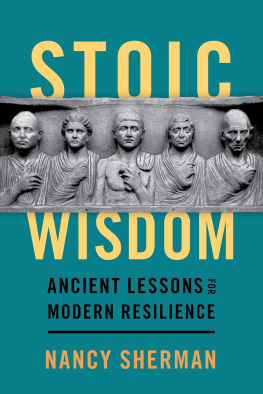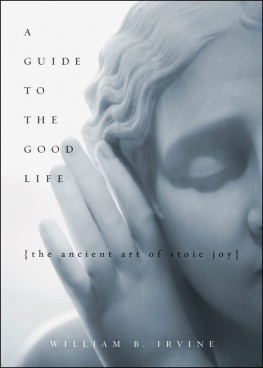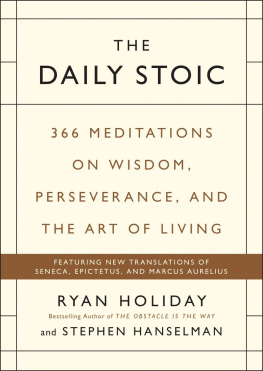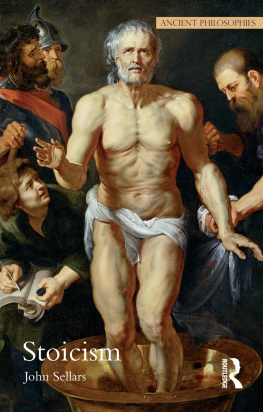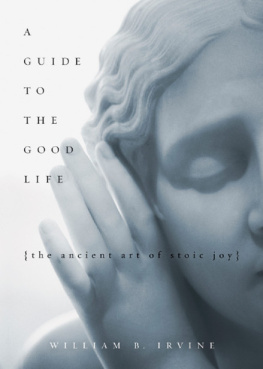Contents
Guide

A LSO BY W ILLIAM B. I RVINE
A Guide to the Good Life:
The Ancient Art of Stoic Joy
You:
A Natural History
On Desire:
Why We Want What We Want
A Slap in the Face:
Why Insults Hurt And Why They Shouldnt
Aha!
The Moments of Insight that Shape Our World
With Two Oars:
Reflections on Sculling
The
S TOIC
CHALLENGE

A Philosophers Guide
to Becoming Tougher,
Calmer, and More Resilient
William B. Irvine

Toughness training is not appropriate for children, teenagers, or individuals undergoing treatment for any physical or emotional condition. Readers are cautioned to consider their age and general health before undertaking any challenge described in these pages. Please consult your doctor or other health care provider (and, if you are pregnant, your ob/gyn) before making changes in your diet or exercise routine.
Copyright 2019 by William B. Irvine
All rights reserved
First Edition
For information about permission to reproduce selections
from this book, write to Permissions,
W. W. Norton & Company, Inc.,
500 Fifth Avenue, New York, NY 10110
For information about special discounts for bulk purchases,
please contact W. W. Norton Special Sales at
specialsales@wwnorton.com or 800-233-4830
Book design by Daniel Lagin Design
Production manager: Julia Druskin
Library of Congress Cataloging-in-Publication Data is available
ISBN 978-0-393-65249-9
ISBN 978-0-393-65250-5 (ebook)
W. W. Norton & Company, Inc.
500 Fifth Avenue, New York, N.Y. 10110
www.wwnorton.com
W. W. Norton & Company Ltd.
15 Carlisle Street, London W1D 3BS
To Loretta Loeb,
for teaching me so much about courage and kindness
CONTENTS
T HE S TOIC C HALLENGE
I was flying across the United States and had to make a connection in Chicago. The plane that would have taken me home was delayed by weather. When it finally arrived, we were asked to board, but as soon as we got seated, we were asked to deplane. The planes cargo door, we were told, wasnt working properly. After we had sat in the terminal for fifteen minutes, we were asked to reboard, which we gladly did.
Ten minutes later the flight attendant made another announcement. The ground crew had successfully gotten the cargo door closed, but then someone realized that one suitcase hadnt been put on board. They opened the door to put it in but were then unable to close it again. The minor problem, in other words, had turned into a major problem. The attendant once again asked us to deplane.
Inside the terminal, the gate agent said they were going to get another plane for us, but shortly thereafter he announced that because the hour was so late, no plane would be available until morning. A groan went up from the passengers. He assured us that the airline would put us up at its own expense at a nearby hotel, an assurance that was met with even more groans. I was, I must admit, among the groaners, but then I realized what was happening: the Stoic gods had contrived this event on my behalf, as a kind of challenge. Game on! I said to no one in particular.
I did this because I knew from experience that by treating this setback as a challengeby assuming, more precisely, that the Stoic gods had administered the setback as a test of my resilience and resourcefulnessI could simultaneously reduce the emotional cost of being set back and increase my chances of finding a workaround. At this point, though, some words of explanation are in order.

T O BEGIN WITH , I am not a member of some obscure religious cult. I am a modern adherent of an ancient philosophy. More precisely, I am a practicing Stoic, in the sense that I have chosen to live my twenty-first-century life in accordance with the strategies for living that were devised two thousand years ago by the Stoic philosophers Marcus Aurelius, Seneca, and Epictetus, among others.
I am not alone in making this choice. A growing number of people have realized that they lack what the ancient philosophers would have called a philosophy of life . Such a philosophy tells you what in life is worth having and provides you with a strategy for obtaining it. If you try to live without a philosophy of life, you will find yourself extemporizing your way through your days. As a result, your daily efforts are likely to be haphazard, and your life is likely to be misspent. What a waste!
It is important to realize that Stoicism is not a religion: its primary concern is not with our afterlife but with our time spent on Earth. That said, I should add that Stoicism is compatible with many religions, including Christianity and Islam. But here another clarification is in order. Above, I made reference to the Stoic gods. I do not believe that these gods actually exist, as physical or even as spiritual beings. They are, for me, fictitious entities. By invoking them, I can transform what for many people would simply be an unfortunate setback into a kind of mind game. Doing this lets me respond to setbacks without becoming frustrated, angry, or despondent.
Those who dislike invoking imaginary gods as part of a psychological strategy may instead invoke an imaginary coach or teacher; the psychological effect will be equivalent. And those who do believe in God may proceed on the assumption that the setback in question is part of Gods plan for themor if they are Muslim, part of Allahs planas many Christians and Muslims already do. In what follows, I will have more to say about the Stoic test mind game and the psychological research that lies behind it, and I will give advice on how best to play the game, but first let me finish my airport story.

W E WERE GIVEN HOTEL VOUCHERS and told to wait for a shuttle bus. We subsequently boarded it and soon arrived at our destination. After waiting in line at the reception desk, I was assigned a room and headed off for what I imagined would be at most four hours of sleep. My room, it turned out, was a long walk and elevator ride from the lobby, and when I opened the door, I saw that it was in a state of disarray.
Had I not been a Stoic, I would at this point have broken into righteous anger: How stupid is this? How dare they? By thinking of it as part of a challenge by the Stoic gods, though, I had a rather different thought: What a clever wrinkle! I hadnt seen this coming. Well played, Stoic gods! I retraced my steps back to the front desk and explained the situation to the clerk.
Had I gotten angry at him, everyone, including the clerk, would have understood. But would getting angry have been worth the price? Clearly not, if what I valued was my equanimity. It also helped me stay calm to think of the clerk not as a malicious person but merely as a bit player in this challenge that the Stoic gods had devised for me.
The clerk gave me the key for a room that, he assured me, ought to be clean. This prediction turned out to be correct. I got what sleep I could and went down in the early morning to board the shuttle that was taking us back to the airport. It carried mostly passengers from my canceled flight, and they spent the ride trying to top each other in their complaints about the airline, the airport, and the hotel. As I watched all this, I felt lucky not to be sharing their disgruntled state of mind.

